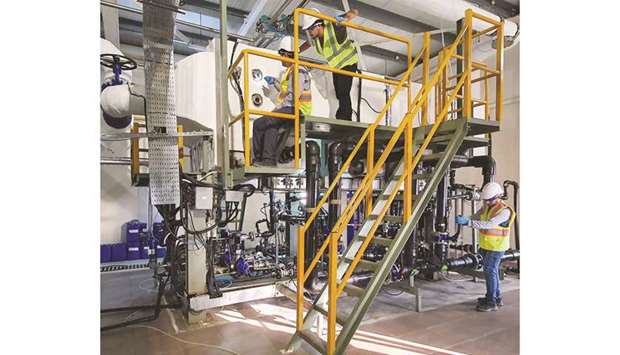*Multi-Effect Distillation (MED) pilot plant operational in Dukhan
Qatar Environment and Energy Research Institute (Qeeri), part of Hamad Bin Khalifa University (HBKU) has developed a seawater desalination pilot plant which is showing higher efficiency than conventional technology – both in energy recovery to reduce thermal energy consumption, and cost effectiveness.
The Multi-Effect Distillation (MED) pilot plant was installed by Qeeri in Dukhan, as part of a 20-year collaboration agreement with Qatar Electricity & Water Corporation (QEWC).
Designed and developed by Qeeri’s Water Centre, the pilot plant has a nominal capacity of 25 to 50 m3 /day, and with the extensive research and technology that has matured over the last three years, the team estimates that the new pilot requires just 4.5 kWh/m3 to desalinate the high concentration seawater (57,000 ppm) of the Dukhan coast, west of Qatar. This is a huge energy saving over the conventional thermal desalination technologies such as multistage flash (MSF), which can require up to 12 kWh/m3.
The competing membrane based technology, reverse osmosis, which has a comparable energy consumption, is not efficient and suffers fouling problems at such high seawater salinity – for comparison, the salinity on the East coast of Qatar is just 43,000 ppm, while the Mediterranean is around 35,000 ppm. The pilot plant displays 40% lower heating steam consumption, and 55% lower pumping power than the existing traditional MED-TVC (thermal vapor compression) technology deployed at the Ras Laffan Plant, translating into a 30% lower unit water cost when operating and capital expenditure are taken into account.
Dr Abdelnasser Mabrouk, senior scientist at Qeeri, and project lead for the MED pilot plant, said, “The project started with a small 3D model, and we worked with our team to reach the pilot plant stage. It has definitely been a long but rewarding journey, from preparing the mechanical design, to scouting for and procuring the material, and finally the manufacturing, which was done overseas. Once the pilot plant was ready, it was shipped and installed at Dukhan. QEWC provided us with the space and other logistical requirements such as electricity, service water, full access to the seawater intake, and brine outfall facility.”
Dr Jenny Lawler, senior research director of the Water Centre at Qeeri, explained, “The desalination programme at the Water Centre is very proud of the progress shown in the significant reduction of energy consumption using MED-AB technology. Successful engagement with key national stakeholders, such as QEWC, as well as national and international academic and industry collaboration, promises advanced MED technology development as a potential solution for reducing energy consumption and water unit cost, showcasing Qeeri’s commitment to market driven R&D."
Dr Marc Vermeersch, executive director at Qeeri, added, “Qatar’s water security relies on alignment of innovations with industry needs, and we focus on addressing the real challenge faced by existing desalination plants in the short term, while continuing to develop Reverse Osmosis Technology as well as the emergent technologies such as membrane distillation and forward osmosis and exploring possible hybridisation techniques. The demonstration of nationally developed innovations at pilot scale and securing patent protection enhances Qatar’s intellectual property status and supports its position as a knowledge-based economy.”
The Multi-Effect Distillation (MED) pilot plant was installed by Qeeri in Dukhan, as part of a 20-year collaboration agreement with Qatar Electricity & Water Corporation (QEWC).
Designed and developed by Qeeri’s Water Centre, the pilot plant has a nominal capacity of 25 to 50 m3 /day, and with the extensive research and technology that has matured over the last three years, the team estimates that the new pilot requires just 4.5 kWh/m3 to desalinate the high concentration seawater (57,000 ppm) of the Dukhan coast, west of Qatar. This is a huge energy saving over the conventional thermal desalination technologies such as multistage flash (MSF), which can require up to 12 kWh/m3.
The competing membrane based technology, reverse osmosis, which has a comparable energy consumption, is not efficient and suffers fouling problems at such high seawater salinity – for comparison, the salinity on the East coast of Qatar is just 43,000 ppm, while the Mediterranean is around 35,000 ppm. The pilot plant displays 40% lower heating steam consumption, and 55% lower pumping power than the existing traditional MED-TVC (thermal vapor compression) technology deployed at the Ras Laffan Plant, translating into a 30% lower unit water cost when operating and capital expenditure are taken into account.
Dr Abdelnasser Mabrouk, senior scientist at Qeeri, and project lead for the MED pilot plant, said, “The project started with a small 3D model, and we worked with our team to reach the pilot plant stage. It has definitely been a long but rewarding journey, from preparing the mechanical design, to scouting for and procuring the material, and finally the manufacturing, which was done overseas. Once the pilot plant was ready, it was shipped and installed at Dukhan. QEWC provided us with the space and other logistical requirements such as electricity, service water, full access to the seawater intake, and brine outfall facility.”
Dr Jenny Lawler, senior research director of the Water Centre at Qeeri, explained, “The desalination programme at the Water Centre is very proud of the progress shown in the significant reduction of energy consumption using MED-AB technology. Successful engagement with key national stakeholders, such as QEWC, as well as national and international academic and industry collaboration, promises advanced MED technology development as a potential solution for reducing energy consumption and water unit cost, showcasing Qeeri’s commitment to market driven R&D."
Dr Marc Vermeersch, executive director at Qeeri, added, “Qatar’s water security relies on alignment of innovations with industry needs, and we focus on addressing the real challenge faced by existing desalination plants in the short term, while continuing to develop Reverse Osmosis Technology as well as the emergent technologies such as membrane distillation and forward osmosis and exploring possible hybridisation techniques. The demonstration of nationally developed innovations at pilot scale and securing patent protection enhances Qatar’s intellectual property status and supports its position as a knowledge-based economy.”

